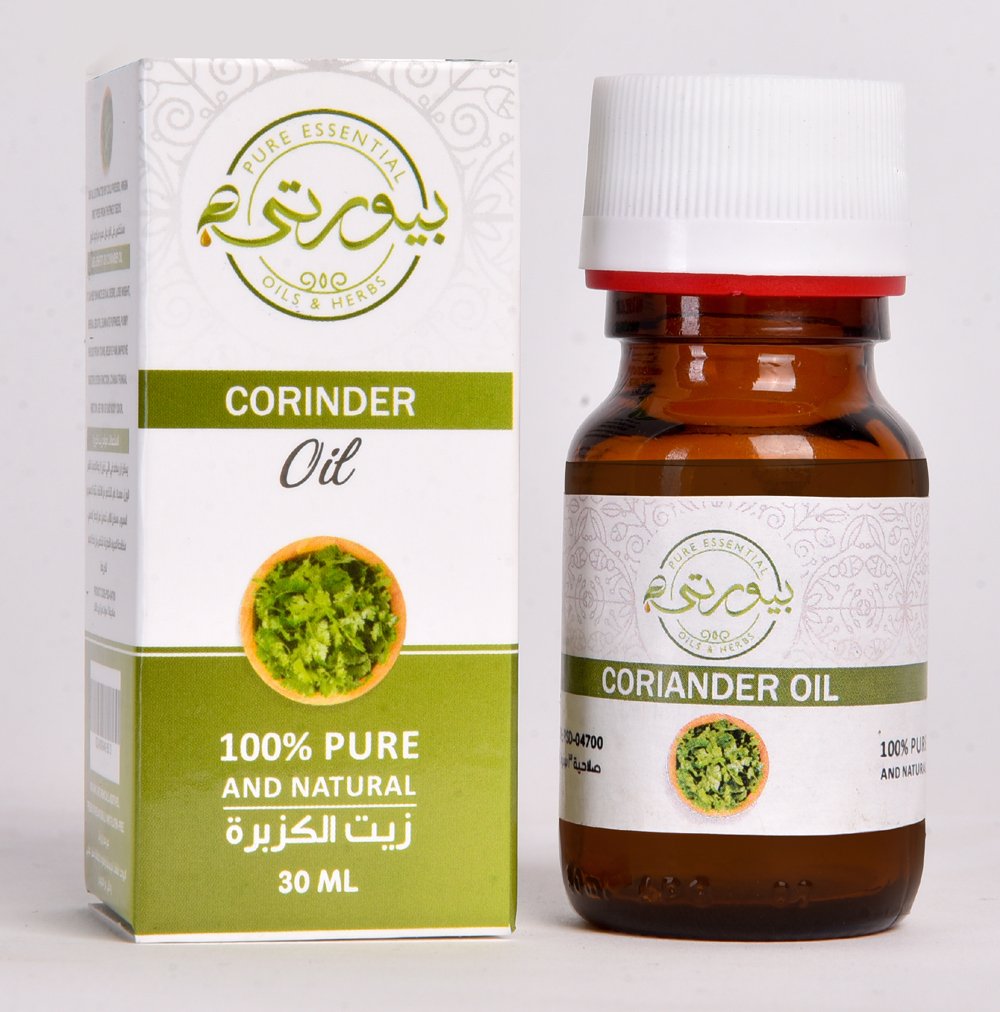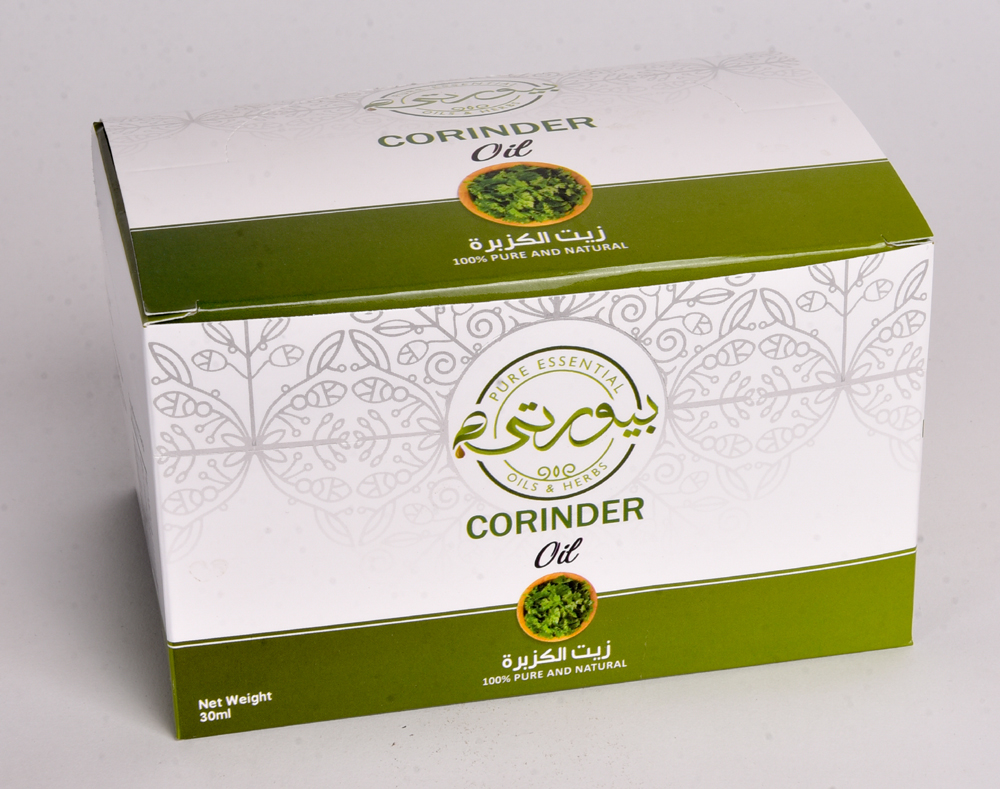Cilantro Herb Infused Oil Cilantro Herb or essential oil infused in Carrier Oil
Login to view prices
Coriander cilantro herb infused Oil, consists of a carrier oil that has been permeated (“infused”) with Coriander cilantro herb or mixed with Coriander cilantro herb essential oil . The benefit to using an infused oil as opposed to a plain carrier oil is that the infused oil will contain the properties of both the carrier oil and Coriander cilantro herb and is suitable for direct use for consumer
This Product for Consumer Retail packaging. if you are interested in Bulk Packaging to buy the oil as raw material, Please browse our Raw Materials
This product is infused oil in diluted form suitable for direct use not very concentrated like essential oil which can not be used directly. please read details below about what is infused oil?
Overview
Coriander is an herb that’s commonly used to flavor international dishes. It comes from the Coriandrum sativum plant and is related to parsley, carrots, and celery. In the United States, Coriandrum sativum seeds are called coriander, while its leaves are called cilantro. In other parts of the world, they’re called coriander seeds and coriander leaves. The plant is also known as Chinese parsley.
Many people use coriander in dishes like soups and salsas, as well as Indian, Middle Eastern, and Asian meals like curries and masalas. Coriander leaves are often used whole, whereas the seeds are used dried or ground.
Here are 8 impressive health benefits of coriander.
1. May help lower blood sugar
High blood sugar is a risk factor for type 2 diabetes . Coriander seeds, extract, and oils may all help lower blood sugar. In fact, people who have low blood sugar or take diabetes medication should practice caution with coriander because it’s so effective in lowering blood sugar. Animal studies suggest that coriander seeds reduce blood sugar by promoting enzyme activity that helps remove sugar from the blood
A study in rats with obesity and high blood sugar found that a single dose (9.1 mg per pound of body weight or 20 mg per kg) of coriander seed extract decreased blood sugar by 4 mmol/L in 6 hours, similar to the effects of the blood sugar medication glibenclamide
A similar study found that the same dosage of coriander seed extract lowered blood sugar and increased insulin release in rats with diabetes, compared with control animals
2. Rich in immune-boosting antioxidants
Coriander offers several antioxidants, which prevent cellular damage caused by free radicals. Its antioxidants have been shown to fight inflammation in your body .
These compounds include terpinene, quercetin, and tocopherols, which may have anticancer, immune-boosting, and neuroprotective effects, according to test-tube and animal studies.
One test-tube study found that the antioxidants in coriander seed extract lowered inflammation and slowed the growth of lung, prostate, breast, and colon cancer cells.
SUMMARY
Coriander is full of antioxidants that demonstrate immune-boosting, anticancer, anti-inflammatory, and neuroprotective effects.
3. May benefit heart health
Some animal and test-tube studies suggest that coriander may lower heart disease risk factors, such as high blood pressure and LDL (bad) cholesterol levels. Coriander extract appears to act as a diuretic, helping your body flush excess sodium and water. This may lower your blood pressure (13Trusted Source). Some research indicates that coriander may help lower cholesterol as well. One study found that rats given coriander seeds experienced a significant decrease in LDL (bad) cholesterol and an increase in HDL (good) cholesterol (15Trusted Source).
What’s more, many people find that eating pungent herbs and spices like coriander helps them reduce their sodium intake, which may improve heart health.
In populations that consume large amounts of coriander, among other spices, rates of heart disease tend to be lower — especially compared with people on the Western diet, which packs more salt and sugar (16Trusted Source).
4. May protect brain health
Many brain ailments, including Parkinson’s, Alzheimer’s, and multiple sclerosis, are associated with inflammation (17Trusted Source, 18Trusted Source, 19Trusted Source). Coriander’s anti-inflammatory properties may safeguard against these diseases.
One rat study found that coriander extract protected against nerve-cell damage following drug-induced seizures, likely due to its antioxidant properties.
A mouse study noted that coriander leaves improved memory, suggesting that the plant may have applications for Alzheimer’s disease (21Trusted Source).
Coriander may also help manage anxiety.
Animal studies demonstrate that coriander extract is nearly as effective as Diazepam, a common anxiety medication, at reducing symptoms of this condition
5. May promote digestion and gut health
Oil extracted from coriander seeds may accelerate and promote healthy digestion.
One 8-week study in 32 people with irritable bowel syndrome (IBS) found that 30 drops of a coriander-containing herbal medication taken thrice daily significantly decreased abdominal pain, bloating, and discomfort, compared with a placebo group.
Coriander extract is used as an appetite stimulant in traditional Iranian medicine. One rat study noted that it increased appetite, compared with control rats given water or nothing.
6. May fight infections
Coriander contains antimicrobial compounds that may help fight certain infections and foodborne illnesses.
Dodecenal, a compound in coriander, may fight bacteria like Salmonella, which can cause life-threatening food poisoning and affect 1.2 million people annually in the United States.
Additionally, one test-tube study revealed that coriander seeds are among several Indian spices that can fight the bacteria responsible for urinary tract infections (UTIs).
Other studies suggest that coriander oil should be used in antibacterial formulations due to its ability to fight foodborne illnesses and hospital-acquired infections.
7. May protect your skin
Coriander may have several skin benefits, including for mild rashes like dermatitis.
In one study, its extract failed to treat diaper rash in infants on its own but could be used alongside other soothing compounds as an alternative treatment.
Other studies note that the antioxidants in coriander extract may help prevent cellular damage that can lead to accelerated skin aging, as well as skin damage from ultraviolet B radiation (33Trusted Source, 34Trusted Source).
Furthermore, many people utilize coriander leaf juice for skin conditions like acne, pigmentation, oiliness, or dryness. Nonetheless, research on these uses is lacking.
8. Easy to add to your diet
All parts of the Coriandrum sativum plant are edible, but its seeds and leaves taste very different. While coriander seeds have an earthy flavor, the leaves are pungent and citrus-like — though some people find that they taste like soap.
Whole seeds can be added to baked goods, pickled vegetables, rubs, roasted vegetables, and cooked lentil dishes. Warming them releases their aroma, following which they can be ground for use in pastes and doughs.
===============
What is Infused Oil?
An infused oil, also referred to as a macerated oil, consists of a carrier oil that has been permeated (“infused” or “macerated”) with one or more herbs or the essential oil of that herb. The benefit to using an infused oil as opposed to a plain carrier oil is that the infused oil will contain the properties of both the carrier oil and the herbs or essential oil and is suitable for direct use for consumer without lot of precautions like concentrated essential oils
Some plants do not have much essential oil contained in them, and in those cases, it is rare or impossible to commercially find an essential oil for that plant species. Infusing the herb into a carrier oil, however, can be a suitable way to still use the herb for aromatherapy purposes.
Infused oils generally have an oily feeling that varies depending on the carrier oil used. They also are not as concentrated as essential oils.
What are carrier oils?
Carrier oils and essential oils are made from plants. Carrier oils are used to dilute essential oils and “carry” them to your skin. That’s because essential oils are potent and can cause irritation when applied directly to your skin.
Most carrier oils are unscented or lightly scented and don’t interfere with an essential oil’s therapeutic properties. They may be used alone or with other oils to nourish your skin.
=========================
What examples of carrier oils we use to make our infused oils?
1. Coconut oil
Coconut oil is an edible oil made from the meat of mature coconuts. It’s available in refined or unrefined varieties. Unrefined coconut oil comes from fresh coconut meat. It’s not processed with chemicals and retains its coconut aroma and flavor. Refined coconut oil comes from dried coconut meat, also called copra. It’s bleached and deodorized to remove contaminants, as well as the distinct coconut aroma and flavor. Refined coconut isn’t all-natural and isn’t recommended for use as a carrier oil.
Uses: Coconut oil contains skin-nourishing fatty acids and polyphenols, which make it a great carrier oil for massage oils and skin care preparations.
2. Jojoba oil
Jojoba oil comes from the seeds of the jojoba plant. It has a delicate, nutty aroma. Technically, jojoba isn’t an oil, but a wax with powerful moisturizing properties. It’s thought to closely mimic sebum, the skin’s natural oil. Using jojoba oil may help reduce the skin’s oil production in acne-prone people by making the skin think it’s produced enough oil.
Uses: Jojoba oil absorbs easily in the skin and doesn’t clog pores. This makes it a good carrier oil option for massage oils, facial moisturizers, and bath oils.
3. Apricot kernel oil
Apricot kernel oil is made from apricot seeds, also known as kernels. It’s an emollient oil high in fatty acids and vitamin E. It absorbs easily into the skin and has a slightly sweet, nutty scent. You can buy edible apricot kernel oil, or apricot kernel oil for cosmetic use only.
Uses: Apricot kernel oil is thought to help soften and calm irritated, itchy skin. Use it as a carrier oil to make massage oils, bath oil, and hair care preparations.
4. Sweet almond oil
Sweet almond oil has a strong, nutty aroma. It’s an edible oil made from the kernels of sweet almonds. The oil is lightweight and absorbs easily, and is a great moisturizer for dry skin.
It’s also used in general aromatherapy, but its strong scent may mask an essential oil’s aroma.
Uses: Sweet almond oil is one of the most popular carrier oils for skin care. It’s great in massage oils, bath oils, and soaps.
5. Olive oil
Olive oil comes from pressed olives. It’s best known as a healthy, edible oil with a fruity aroma, but it’s also used in aromatherapy as a carrier oil.
Extra-virgin olive oil is the preferred variety for aromatherapy and skin care preparations. Olive oil’s scent may interfere with the scent of some essential oils.
Uses: It’s packed with fatty acids and plant sterols, which make it great for cleansing and moisturizing dry skin. Use olive oil as a carrier oil for massage, facial cleansers, hair care, and homemade soaps.
6. Argan oil
Argan oil is made from kernels found inside the fruit of argan trees, which are native to Morocco. The oil is edible and is traditionally used to nourish the body inside and out. It has a nutty aroma and is rich in vitamins A and E, and monounsaturated fatty acids.
Uses: Argan oil can help treat dry skin and hair, wrinkles, and skin inflammation. This makes it a terrific carrier oil for general skin care and massage oils.
7. Black seed oil
Black seed oil is made from the Nigella sativa plant. Although it’s lesser known than other carrier oils, it’s richTrusted Source with unsaturated and saturated fatty acids. It’s also thought to have anti-inflammatory abilities.
Uses: Black seed oil is often used as a folk remedy to soothe skin conditions including eczema, acne, and psoriasis. With this in mind, it’s a great choice for facial care, massage oils, and general skin care.
=================================================
Quotation:
· Quantity: There minimum order per each packaging type. kindly contact us to know more details and discuss the best options for you
· Specification: 100% natural and Pure quality Organic or Conventional
· Documentation: COA, MSDS, TDS,.. Kindly see more information tab in the product page to see all documents available
· Payment terms: TT in advance to Our bank account
· Lead time: Shipping through 10 days from receipt of the payment.
· Sea Shipping Time: 35 days
· Air shipping time: 10 days
Branding Services
We also can do customized packaging for you to bottle whatever size you like. We can help in designing labels, selecting good bottles, and packaging. We deliver integrated solutions under your brand..
Additional information
| Weight | N/A |
|---|---|
| Dimensions | N/A |
| Oil Purity | This is infused Oil. Plant, Flowers, Essential oil infused in natural Carrier oil |
| Country of Origin | Egypt |
| Ship from | China, Egypt |
| Cultivation Type | Organic, Conventional |
| Oil Retail Packaging | Size 15 ml , Pack has 12 bottles. Carton has 8 Packs = 96 bottles/carton, Size 30 ml , Pack has 12 bottles. Carton has 8 Packs = 96 bottles/carton, Size 60 ml , Pack has 12 bottles. Carton has 8 Packs = 96 bottles/carton, Size 125 ml , Pack has 6 bottles. Carton has 5 Packs = 30 bottles/carton, Size 250 ml , Pack has 6 bottles. Carton has 4 Packs = 24 bottles/carton, Size 500 ml , Pack has 4 bottles. Carton has 4 Packs = 16 bottles/carton, Size 1000 ml , Pack has 4 bottles. Carton has 2 Packs = 8 bottles/carton |
| HS Code | 33012945 |
| CAS-Code | 8014-13-9 |
| Oil Documentation Available | Allergen Free Certificate, Bovine Spongiform Encephalophathy (BSE) Certificate, Certificate of Analysis (COA), GMO Certificate, GRAS Status Statement, Halal Certificate, Herbal Origin Statement, KOSHER Certificate, Manufacturing Flow Chart, Material Safety Data Sheet (MSDS), Organic Certificate, Pesticide Residual Certificate, Researches & Studies, Technical Data Sheet (TDS), WADA Prohibited list Statement |
| Custom Branding & Packaging | Yes, OEM Custom banding, designing and packaging are available for that product |
| Bulk Packaging Availability | Yes we can provide you the product in Bulk Packaging |
-
Login to view prices
Orange Infused Oil (Natural Orange peels or oil infused in Carrier Oil)
Login to view prices Read more -
Login to view prices
-
Login to view prices
Jasmine Infused Oil (Natural Jasmine oil or flowers infused in Carrier Oil)
Login to view prices Read more -
Login to view prices
-
Login to view prices

















